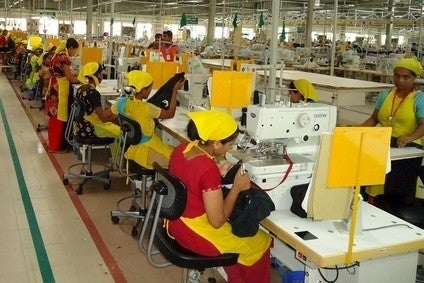
Bangladesh’s garment manufacturers have threatened to halt production and any further orders with Edinburgh Woollen Mill (EWM) group over unpaid invoices and demands for “unreasonable” discounts, despite concluded contracts.
In a letter to owner Philip Day, who’s group includes outlets such as Peacocks, Austin Reed and Jaeger, Dr Rubana Huq, president of the Bangladesh Garments Manufacturing and Exporters Association (BGMEA), says EWM is taking “undue advantage” of the Covid-19 situation.
She says the discounts being requested are “not only impossible to grant by our members, but also in violation of local laws, international acceptable standards; and moreover defy all the principles of ethical sourcing and governance that international brands and organisations expect of the industry and all its stakeholders”.
“It should be noted that the demand for the discounts will not only be financially catastrophic, but will also expose our members to various claims and liabilities from regulations, banks and other third parties, which will eventually legally implicate the buyers themselves,” Huq writes.
The letter demands payment for goods already shipped and handed over to freight forwarders by 29 May, and for orders already placed, notes negotiation between the exporter and the buyer should be concluded by 5 June. It says any discount requested by the retailer “beyond permissible limits” could lead to legal action.
The letter warns: “In the event that the instructions provided herein above are not followed, we will have no option but take the decision to place an embargo and black-list the buyers and their agents who do not comply with our instructions, which will prevent them from conducting business with our members in the future either directly and indirectly.

US Tariffs are shifting - will you react or anticipate?
Don’t let policy changes catch you off guard. Stay proactive with real-time data and expert analysis.
By GlobalData“Please appreciate that we have to take a strong stance on this matter for the purpose of preserving the interest and survival of our members, its stakeholders, the international image of the industry and more importantly compliance with local laws and foreign exchange restrictions.”
Like many other clothing export nations, Bangladesh has suffered as brands and retailers cancel and postpone orders due to lockdowns resulting in stores closing globally.
The latest BGMEA estimate suggests 1,150 factories with 2.28m workers have seen export orders worth US$3.18bn cancelled or suspended by global retailers and brands.
EWM response
A spokesperson for EWM Group said: “We only received the letter from the BGMEA today, and we are disappointed it has been shared more widely before we have had the chance to respond, consider the proposals, and work together to find a solution.
“When this global crisis hit, we had already paid for the majority of future stock, and we have since had productive discussions with individual suppliers about remaining stock. We have engaged with all our individual suppliers with openness, honesty, and the best of intentions, even when the circumstances are difficult.
“We have looked at literally every option on the table and worked hand-in-hand with all our suppliers to find solutions, but we also need to recognise that these are difficult and complicated issues. There are not simple problems, and every potential quick solution has long-term implications. If we took delivery of remaining unmade stock for the Spring season with all our stores closed, this stock would only be stored for next year and depress 2021 orders.
“Our discussions with suppliers have been had on the basis of the trust and mutual respect we have built up working together for decades. We have worked in Bangladesh for more than 30 years, and we’re disappointed that the BGMEA appears to be questioning our honest intentions and sidelining the time and energy we have put into trying to find forward-thinking solutions.
“We firmly view this to be a reasonable approach in the face of a collective and global industry challenge, which isn’t just disrupting a single link in the supply-chain. Nobody planned this international crisis, and it is only by working together constructively that we will be able to tackle a challenge as unprecedented as coronavirus. Our discussions with the vast majority of suppliers have been positive, and they have understood that we are trying to find a balanced way forward that matches the immediate, urgent challenges faced by high-street stores nationally and those of suppliers.
“We are left with a very bitter taste in our mouth over the sincerity of this letter. We think their approach has been unproductive and uncollaborative. This is the first time we have heard from the BGMEA, and we question why they have not tried to engage with us constructively over the last few months nor tried to confirm the facts about our discussions with suppliers before sending this letter — something that we would have actively welcomed.
“We also question why this letter was sent just before the holiday season of Eid, when much of Bangladesh is closed, which will make it very difficult, if not impossible, to have productive discussions.
“It is disappointing to see the BGMEA try to bypass and invalidate these discussions which have been productive with the very vast majority of suppliers. We have already heard feedback from a number of suppliers who belong to the BGMEA who disagree with the Association’s approach which appears to be putting media noise and tactics above engagement, discussion and solutions.”




